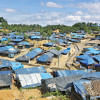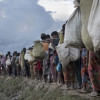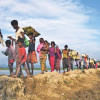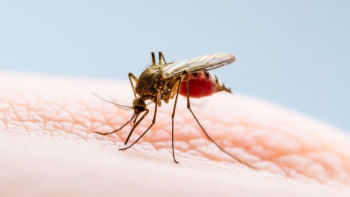Confronting genocidal regime and global apathy: The Rohingya perspective

"We have been victims of genocide for decades and acknowledged as the most persecuted minority, yet the world has cared little about our legitimate rights and claims. It is time we took charge of our own destiny." This was the clear and unequivocal message of an assembly of Rohingya elders who met in the historic city of Sarajevo last month, a city that experienced the brutality of another genocidal regime almost three decades ago. Ironically, in the latter case, the genocide was brought to an end by the collective resolve and decisive action of some of the most powerful nations in the world.
This conclave of influential Rohingya leaders from across the world, including the US, Canada, the UK, Germany, Australia, Japan and Bangladesh, was held at a time when atrocities by the military regime of Burma (Myanmar) continues against the Rohingya people, rendering tens of thousands displaced and a huge number fleeing the shores of Arakan (Rakhine). It happened when millions of Rohingyas live in dire and uncertain conditions in other countries (many without legal status), when tens of thousands, without any protection structure, remain vulnerable to human traffickers and smugglers, when their welcome and hospitality in the host countries become increasingly tenuous. The meeting took place when countries that once embraced Rohingya refugees inspired by humanitarianism now begin to show signs of compassion fatigue and express their irritation of Rohingya presence in the land openly, when the mandated body to ensure global peace and security, the UN, persistently fails to ensure any redress, and when a section of powerful states unashamedly continue to bolster the genocidal regime, while others dither to recognise the mass atrocity against the Rohingyas as genocide and act accordingly.
The Rohingya leaders reminded the world that the right to life, liberty, and pursuit of happiness are inalienable rights of every human being, and such rights cannot be suspended, usurped or violated by any government, people or community. They further reminded the world that the global community has committed that the perpetrators of genocide and crimes against humanity, whether state or non-state actors, and those who aid and abet such acts must be held accountable and must face justice individually and collectively, and it is the duty of all actors to prevent torture, atrocities, acts of genocide and mass violence and restore, protect, promote and respect human rights for all.
At a time when the Rohingya issue appears to be losing global interest, the leaders demanded that the international community firmly keep the cause at the forefront of their diplomatic agenda, including that of the UN Security Council, General Assembly, and Human Rights Council. Expressing satisfaction with the positive developments at the International Court of Justice and the recent determination of Burmese state crimes in Arakan as genocide by the US, they expressed deep concern at the continued genocidal acts by the Burmese authorities in Arakan and at the lack of progress to bring about a political solution.
The Rohingya elders called upon the international community to comprehensively investigate the ongoing acts of genocide, crimes against humanity, and war crimes in Burma, and demand the prosecution and punishment of the perpetrators of such violations, and to protect the Rohingyas from further harm.
To ensure accountability of atrocities, the Rohingya elders extended their support to the establishment of an Independent Investigative Mechanism for Myanmar (IIMM) by the UN Human Rights Council through Resolution 39/2 to collect, consolidate, preserve and analyse evidence of the most serious international crimes and violations of international law committed in Myanmar since 2011. The leaders also urged the international community to extend solidarity and support to the Gambia as it defends its case referral to the International Criminal Court (ICC) and to explore all avenues of justice and accountability for the Rohingya people, including through invoking universal jurisdiction.
The Rohingya leaders called upon all states – individually and collectively as well as on regional and international bodies, including Asean, Bimstec and the OIC – to impose targeted sanctions on those individuals in the Burmese military regime that are responsible for the atrocious crimes, until such time as the state ends genocide, recognises the Rohingya ethnic identity under the Burmese state framework, restores citizenship rights to the Rohingyas, rescinds oppressive and apartheid kinds of laws, and returns properties and land to the displaced Rohingya people and other affected minorities.

At a time when moves are afoot for repatriation of some refugees from Bangladesh to Burma at the behest of a powerful state without ensuring due protection, the leaders underscored that it is the duty of the international community to ensure that the Burmese authorities create enabling conditions in Arakan for the voluntary, safe, dignified and sustainable return of refugees and those forcibly displaced within Burma. They also demanded that refugees should be repatriated only after ensuring their protection in Burma and securing informed consent of the individuals and households concerned. They unequivocally stressed that the right to return to one's homeland is an inalienable right of every person, as enshrined in the Universal Declaration of Human Rights and the 1966 International Covenant for Civil and Political Rights (ICCPR).
Reacting to the international community's high but unrealistic expectation from the National Unity Government (NUG) in Burma, the Rohingya leaders noted that its Rohingya policy lacks direction, coherence and transparency. They demanded that the NUG must publicly commit to rescind the discriminatory citizenship law to ensure equal rights and status of the Rohingyas as Burmese citizens, upholding the sociocultural, political, and economic rights of the population, and accept the UN Fact Finding Mission's report and recognise the Rohingya genocide. They also urged the NUG to act through its National Unity Consultative Council (NUCC) to include the Rohingyas as a representative ethnic group and include them and other affected minorities in designing an inclusive federal democratic Myanmar.
In view of the ongoing armed conflict between the Arakan Army and the Burmese government in Arakan, the Rohingya leaders called upon the United League of Arakan and the Arakan Army to uphold and respect the human rights of the Rohingya people, and to cease the ongoing violence, harassment and seizure of Rohingya lands and imposition of arbitrary tax and create enabling conditions for peaceful coexistence of the communities.
While they acknowledged the generous admission and support granted to Rohingya refugees by several countries, especially Bangladesh, the leaders urged those countries to continue to extend their support and protection of all refugees, including women, children, the elderly, widows and persons with disabilities, and called upon them to continue to treat the Rohingyas with compassion, guided by humanitarianism and international standards. They further urged the countries to provide appropriate documentation to the Rohingyas in irregular status so that their rights and dignity are protected, to offer amnesty to those in detention for irregular entry, and to uphold the principle of family unity. In view of recent moves by some states to forcibly deport Rohingyas to Burma, the leaders appealed to desist from such acts as the life and liberty of such returnees could be at risk. They reminded the states that such deportation amounts to the violation of the principle of non-refoulement, an important tenet in international human rights law.
In order to make effective and fruitful use of resources mobilised to support the refugees, the Rohingya leaders urged engaging the refugees in the planning and decision-making processes on matters that affect them and their community, in line with the 2018 Global Compact on Refugees.
At the Sarajevo meeting, the Rohingya elders called upon all host countries to uphold the rule of law and international norms and practice in the treatment of Rohingyas, including their right to education, skill development, health, work, security and freedom of movement. They appealed to the Bangladesh government to ensure proper and credible investigation into cases of killings, arson, harassment and violence involving Rohingya refugees and provide them with access to justice; to ensure that any relocation of Rohingya refugees to Bhasan Char is voluntary and informed, and the rights of the people on the site are upheld and respected; and to allow registered NGOs and donor agencies safe and unhindered access to continue to provide humanitarian aid to the refugees.
Despite facing immeasurable hardships and challenges for generations, the Rohingyas have shown a remarkable degree of resilience and fortitude. They also demonstrated their commitment to non-violence to realise their political goals. However, the continued genocidal practices of the Burmese regime with relative impunity and the accompanying apathy of the global community have begun to take a toll on such an approach. The world must acknowledge that it is unfair to expect the Rohingyas to continue to adhere to non-violent methods when they are subjected to extreme violence and gross injustice for generations. They must acknowledge that all peoples are entitled to exercise the right to self-determination and the right to self-defence when faced with existential threat. History is replete with evidence, including that of Bangladeshis, that if those rights are denied, then the affected people have the right to resort to arms, and the Rohingyas are no exception.
Dr CR Abrar is an academic and the head of the Refugee and Migratory Movements Research Unit (RMMRU).

 For all latest news, follow The Daily Star's Google News channel.
For all latest news, follow The Daily Star's Google News channel. 









Comments